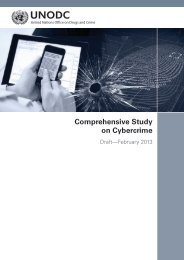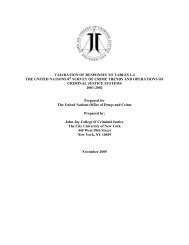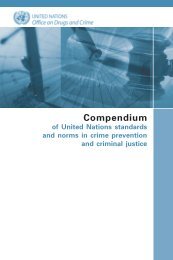Manual for Training Police on Anti Human Trafficking
Manual for Training Police on Anti Human Trafficking
Manual for Training Police on Anti Human Trafficking
You also want an ePaper? Increase the reach of your titles
YUMPU automatically turns print PDFs into web optimized ePapers that Google loves.
<str<strong>on</strong>g>Manual</str<strong>on</strong>g> <str<strong>on</strong>g>for</str<strong>on</strong>g> <str<strong>on</strong>g>Training</str<strong>on</strong>g> <str<strong>on</strong>g>Police</str<strong>on</strong>g> <strong>on</strong> <strong>Anti</strong> <strong>Human</strong> <strong>Trafficking</strong> 66<br />
Men have more privileges<br />
Women are socialized into subordinate roles by societal instituti<strong>on</strong>s<br />
They have less access to opportunities<br />
They have no c<strong>on</strong>trol over their own bodies<br />
They have limited c<strong>on</strong>trol over their own development<br />
They are brought up to serve men<br />
Their work is not valued<br />
Their primary role is reproducti<strong>on</strong><br />
They are <str<strong>on</strong>g>for</str<strong>on</strong>g>ced to give sexual favours to their bosses<br />
They are discriminated against especially in leadership positi<strong>on</strong>s<br />
EXERCISE<br />
<str<strong>on</strong>g>Police</str<strong>on</strong>g> Sensitivity to Survivors<br />
Estimated time : 25 mins<br />
Material required : Case studies<br />
Methodology : Role play<br />
Expected outcome : At the end of the exercise the participants will understand the importance<br />
of sensitive and empathetic behaviour<br />
Activity<br />
Refer to the five set of cases presented in Module Two (<str<strong>on</strong>g>Police</str<strong>on</strong>g> Acti<strong>on</strong>) in pages 37-38 and have participants<br />
read them.<br />
Select/request volunteers from the group to come <str<strong>on</strong>g>for</str<strong>on</strong>g>ward and c<strong>on</strong>duct a role play wherein two situati<strong>on</strong>s<br />
are enacted – keeping in mind the need <str<strong>on</strong>g>for</str<strong>on</strong>g> empathetic police behaviour and gender-sensitive attitudinal<br />
resp<strong>on</strong>se.<br />
Note to the facilitator<br />
The facilitator must ensure that the participants understand the discrepancies in terms of police<br />
handling in the menti<strong>on</strong>ed cases be<str<strong>on</strong>g>for</str<strong>on</strong>g>e attempting to per<str<strong>on</strong>g>for</str<strong>on</strong>g>m the role play. Having enlisted<br />
the discrepancies and the gaps of police resp<strong>on</strong>se, the participants may enact a simple and step<br />
wise handling of any two cases in a sensitive and empathetic manner. The rati<strong>on</strong>ale of the<br />
exercise is to rein<str<strong>on</strong>g>for</str<strong>on</strong>g>ce the understanding of the police pers<strong>on</strong>nel about the survivor’s need to<br />
be respected and the survivor’s percepti<strong>on</strong> of police as a ‘support system’ as opposed to the<br />
police as an ‘abuser’.<br />
Often interacti<strong>on</strong>s and learning during a training program may overwhelm the participants. Post training<br />
participants may be over enthusiastic to implement all the learning or they may feel it is too hum<strong>on</strong>gous<br />
a task to be accomplished. It is, there<str<strong>on</strong>g>for</str<strong>on</strong>g>e very important to have them identify achievable acti<strong>on</strong> points<br />
and define a time frame <str<strong>on</strong>g>for</str<strong>on</strong>g> the same. D<strong>on</strong>’t leave it open-ended. You may do the following closure<br />
exercise:

















